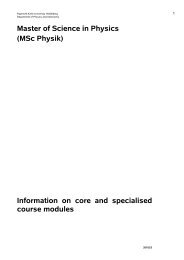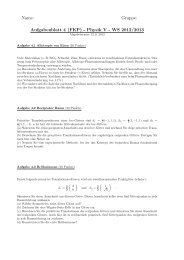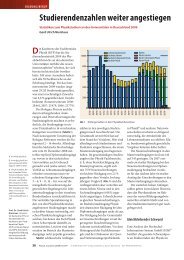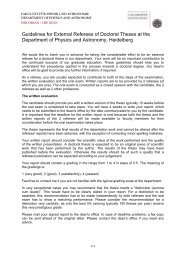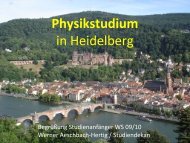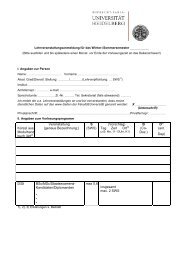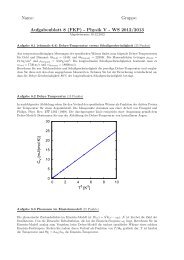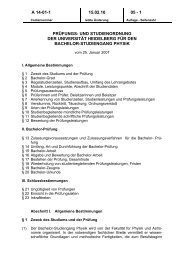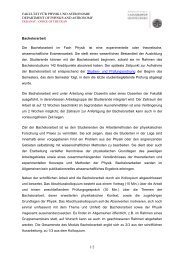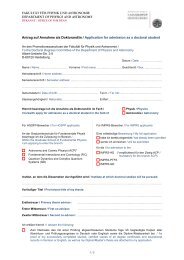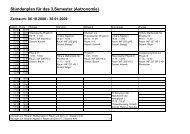Master - Fakultät für Physik und Astronomie
Master - Fakultät für Physik und Astronomie
Master - Fakultät für Physik und Astronomie
You also want an ePaper? Increase the reach of your titles
YUMPU automatically turns print PDFs into web optimized ePapers that Google loves.
Ruprecht-Karls-University Heidelberg 27<br />
Department of Physics and Astronomy<br />
Code: MVAstro1<br />
Course Title: Observational Methods<br />
Programme: <strong>Master</strong> of Science (Physics)<br />
Type: Lecture and laboratory course<br />
Credit Points: 6<br />
Workload: 180 h<br />
Teaching Hours: 5<br />
/week<br />
Mode:<br />
WPM<br />
Term:<br />
WS<br />
Module Parts:<br />
• Lecture on Observational Methods (2 hours/week)<br />
Exercise (1 hour / week)<br />
• Laboratory Course (2 hours/week)<br />
Module Contents:<br />
Module Part 1: Lecture „Observational Methods“ (4 LP)<br />
• Optics and telescopes (4): geometrical optics, Fraunhofer diffraction; refracting and<br />
reflecting telescopes; construction of telescopes and their properties; imaging errors,<br />
aberration and their corrections; structure and mounting of telescopes<br />
• Influence of the atmosphere on astronomical observations (4): Transmission, emission,<br />
their wavelength dependence and correction methods; atmospheric turbulence and seeing<br />
• Adaptive and active optics (2): Basics; wave front sensors and correction methods;<br />
practical application<br />
• Detectors (3): Principals and construction of CCDs, sensitivity, linearity and stability; readout<br />
methods, charge transfer and accumulation, read-out noise; infrared detectors and<br />
arrays<br />
• Imaging, photometry and spectroscopy (2): Reduction and combination of image data;<br />
photometric units, filter systems, point spread function, measuring methods and<br />
calibration; spectroscopic methods, reduction of spectroscopic data<br />
Module Part 2: Astrophysical Laboratory Course II (2 LP)<br />
By means of well-posed astrophysical problems on the following topics advanced<br />
astronomical/astrophysical techniques concerning sampling, data bases and statistical<br />
methods will be trained:<br />
• Planetary systems: Discovering methods, properties, observed frequencies;<br />
• Stellar dynamics: Dynamics of stellar systems, mass determinations;<br />
• Galaxy evolution: Morphological properties, stellar populations, intergalactic medium;<br />
• Radiative processes: Thermal, non-thermal, radiative transfer;<br />
• Observational cosmology: Distance determination, quantification of cosmological<br />
parameters<br />
Objective: Presentation of modern astronomical telescopes and instruments, their<br />
functional properties and limits for students with special interest in astronomy; performing<br />
the practical course, solving exercises and presentation of the results.<br />
Necessary/useful Knowledge: Basic knowledge on electromagnetic radiation and Fourier<br />
theory; content of “Introduction to Astronomy and Astrophysics I and II” (WPAstro);<br />
Recommended Literature: To be announced by lecturer<br />
Specialties: Exercises; Laboratory course is a 1 week block course; there is a strong<br />
overlap with MKEP5 (acceptance of MKEP5 or MVAstro1 is exclusive).<br />
Form of Testing and Examination: defined by lecturer before beginning of course<br />
2012.1/v2



